|
|
|
Sort Order |
|
|
|
Items / Page
|
|
|
|
|
|
|
| Srl | Item |
| 1 |
ID:
149258
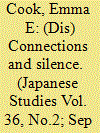

|
|
|
|
|
| Summary/Abstract |
Doing work that is characterized by instability and low incomes, Japanese male part-time workers often remain in the natal home well into adulthood even in cases where there is considerable discord and where familial bonds are strained or complicated. Through detailed case studies this article examines how, for some male part-time workers, a desire to disconnect from familial kin in the search for individual autonomy leads to the creation of alternative forms of relatedness. Meanwhile, for others, pressure to work in particular ways combined with the negotiations of complex family relationships – especially with (male) heads of households – contributes to alienation from family and society. Although work status is not the only cause of family strain, gendered work expectations and labour pressures considerably contribute to discord and can lead to significant experiences of social exclusion and disconnection from the family and wider society.
|
|
|
|
|
|
|
|
|
|
|
|
|
|
|
|
| 2 |
ID:
189251


|
|
|
|
|
| Summary/Abstract |
Japan-South Korea relations have consistently been presented by International Relations scholars as a puzzle that confounds mainstream rationalist theories, which struggle to explain the consistent acrimony associated with the so-called ‘history problem’. While many scholars have, therefore, adopted conventional constructivist approaches to incorporate history into their analyses, such literature often neglects the processes of (re)construction of this social reality, thereby implicitly treating these negative sentiments as essentialised elements of Korean and Japanese culture/identity which cause certain foreign policies. Using the recent Japan-South Korea trade dispute as a case study, this article instead draws on critical constructivist/poststructuralist theory and discourse analytical methods to examine how the ‘history problem’ is produced and reproduced. It argues that dominant discourses of remembering in South Korea, which represent Japan as an unrepentant colonial aggressor, and of forgetting in Japan, which represent South Korea as emotional and irrational for dwelling on the past, act to (re)produce identities that clash in their attitudes to difficult history. While such foreign policy practices (re)produce dominant national identities, these identities also shape the bounds of which foreign policies are legitimate or imaginable. This mutually constitutive relationship between identity and foreign policy continually reproduces the ‘history problem’ in Japan-South Korea relations.
|
|
|
|
|
|
|
|
|
|
|
|
|
|
|
|
| 3 |
ID:
064531
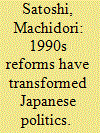

|
|
|
| 4 |
ID:
157478
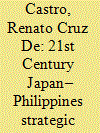

|
|
|
|
|
| Summary/Abstract |
The Philippines and Japan have evolved a security partnership in the face of China's maritime expansion in the South and East China Seas. The two countries pursue this security partnership through regular bilateral consultations among Philippine and Japanese heads of states, political leaders, defense ministry officials, and high-ranking military officers; joint naval exercises; and exploratory discussions for arms transfers and negotiations for a Status of Forces Agreement (SOFA) between Japan and the Philippines. Initially, Article 9 of Japan's 1947 Constitution hindered this security partnership. However, a recent reinterpretation of the pacifist constitution now allows Japan a collective self-defense “particularly to export arms to its allies and security partners and to deploy the JSDF overseas when necessary. Now, the challenge for Japan and the Philippines is to ensure the viability of their security partnership in the light of Philippine President Rodrigo Duterte's efforts to improve his country's relations with China.
|
|
|
|
|
|
|
|
|
|
|
|
|
|
|
|
| 5 |
ID:
125113
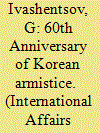

|
|
|
|
|
| Publication |
2013.
|
| Summary/Abstract |
ON JULY 27, 2013, it will be 60 years since the Armistice Agreement was signed in the village of Panmunjom, putting an end to the three-year Korean War. That war, which has become the bloodiest and most devastating military conflict since the end of World War II, remains an unhealed wound for the Koreans while its consequences are still making an impact on the international situation in Northeast Asia and beyond.
|
|
|
|
|
|
|
|
|
|
|
|
|
|
|
|
| 6 |
ID:
092718
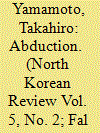

|
|
|
| 7 |
ID:
092927
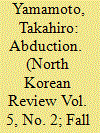

|
|
|
|
|
| Publication |
2009.
|
| Summary/Abstract |
The abduction of 16 Japanese citizens from Japan by agents of the North Korean government took place from 1977 to 1983. In spite of a series of negotiations on this issue between the two countries, little has changed after the return of the five abductees and their family members in 2004. It is high time for Japan to ask such questions as: Has Japan failed? Is it really possible to bring all the abductees back? If not, what went wrong? This paper argues that Japan's massive public relations strategy toward its citizens, although successful in garnering public support, eventually backfired on the government: it left too little room for them to negotiate with North Korea. However, with the attention of the public being diverted from the abduction issue for a while, it may be a good time for Japan to overhaul its negotiation strategy.
|
|
|
|
|
|
|
|
|
|
|
|
|
|
|
|
| 8 |
ID:
163856


|
|
|
| 9 |
ID:
124900
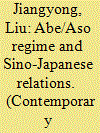

|
|
|
|
|
| Publication |
2013.
|
| Summary/Abstract |
The establishment of the "Abe/Aso regime" is one result of the rise of the Japanese right-wing forces. The Abe government has denied Japanese aggression history and tried to revise the Japanese Constitution in order to reconstruct powerful military forces. It has also used the Diaoyu Islands issue to serve its domestic and foreign policy objectives, causing a serious backslide in Sino-Japanese relations.
|
|
|
|
|
|
|
|
|
|
|
|
|
|
|
|
| 10 |
ID:
078022
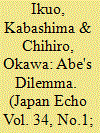

|
|
|
|
|
| Publication |
2007.
|
| Summary/Abstract |
Abe Shinzô took over as prime minister of Japan on September 26, 2006. Thanks to the support of former Prime Minister Koizumi Jun'ichirô and his own popularity among the public at large, Abe assumed office with a strong base after winning the Liberal Democratic Party presidency with an impressive 66% of the total vote from LDP Diet members and local party chapters. In his previous positions as chief cabinet secretary and LDP secretary general, Abe supported the reforms initiated by the Koizumi administration.
According to a public opinion poll conducted by the Asahi Shimbun (published on September 28, 2006), the newly formed Abe cabinet enjoyed an approval rating of 63%-not quite as high as Koizumi's public support on taking office, but still the third-highest approval rating on record for a Japanese prime minister. However, a more recent Asahi poll (December 12, 2006) showed his public support dropping to 47%, owing mainly to disillusionment among young voters and those with no party affiliation (independent voters). The major reasons given were the vagueness of Abe's policy positions on issues and his decision to readmit into the LDP a group of dissenters who had opposed Koizumi's postal privatization plan.
|
|
|
|
|
|
|
|
|
|
|
|
|
|
|
|
| 11 |
ID:
130619
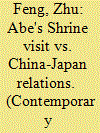

|
|
|
| 12 |
ID:
123357
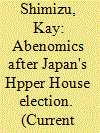

|
|
|
|
|
| Publication |
2013.
|
| Summary/Abstract |
Although July's electoral victory was a necessary condition for pushing Abe's economic program forward, a closer look at the election results and the prime minister's current political positioning reveals a number of challenges ahead."
|
|
|
|
|
|
|
|
|
|
|
|
|
|
|
|
| 13 |
ID:
128428
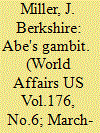

|
|
|
|
|
| Publication |
2014.
|
| Summary/Abstract |
China's aggressive actions in the East China Sea, combined with other factors, especially North Korea's continuing intransigence, have created an increasingly hostile security environment for Japan. Its response to these events can be seen in the impressive political rebirth of Shinzo Abe and the Liberal Democratic Party. While Abe, currently serving as prime minister for a second time, was elected largely because of his economic policies and the ineptitude of the formerly ruling Democratic Party of Japan, he has used his mandate to press forward with long needed, albeit controversial, defense and security reforms that indicate the seriousness with which Tokyo takes its current situation. With China looming up in front of them, and Pyongyang posing lesser but still worrisome threats, the Japanese have become acutely aware of the fact that their Self-Defense Forces (SDF) have one hundred and forty thousand ground troops, one hundred and forty-one maritime vessels, and four hundred and ten aircraft, while China's People's Liberation Army has one million six hundred thousand troops and North Korea has one million soldiers. Meanwhile, North Korea maintains a significant, if decaying, navy and air force, with one hundred and ninety vessels and approximately six hundred aircraft. China's much more capable maritime and air assets include nine hundred and seventy vessels and two thousand five hundred and eighty aircraft.
|
|
|
|
|
|
|
|
|
|
|
|
|
|
|
|
| 14 |
ID:
132902
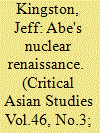

|
|
|
|
|
| Publication |
2014.
|
| Summary/Abstract |
Prime Minister Abe Shinz()'s nuclear renaissance involves downplaying risks, restarting reactors, building new ones, and exporting reactor technology and equipment. Polls in japan indicate that the public remains overwhelmingly op- posed to Abe's nuclear agenda, but in various national and local elections since late 2012 antinuclear candidates have not fared well. This article examines the disjunc-ture between public preferences and electoral outcomes and why is it likely that Japan will restart reactors despite widespread concerns about safety, the high costs of nuclear energy, and the lack of a site for permanent disposal of nuclear waste. The safety myth is being reealibrated, but the author argues that it remains based on rosy assumptions in a nation especially prone to massive seismic disasters. The reinstatement of nuclear energy in the 2014 national energy policy marks a victory for the nuclear village, a remarkable example of institutional resilience in the face of extremely adverse developments since the massive earthquake and tsunami of 1 1 March 2011 that precipitated three reactor meltdowns in Fukushima. Despite extensive revelations about shoddy safety practices in the nuclear industry and collusive relations between regulators and those they regulate, Abe has successfully promoted a nuclear revival that few would have thought possible before his election in 2012. Reactor restarts face a number of hurdles, but the pronuclear lobby now finds it has a policy opening. The summer of 2014 has been a nuclear-free one, but in all likelihood it will be Japan's last for decades to come.
|
|
|
|
|
|
|
|
|
|
|
|
|
|
|
|
| 15 |
ID:
130617


|
|
|
| 16 |
ID:
113879
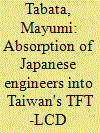

|
|
|
|
|
| Publication |
2012.
|
| Summary/Abstract |
In recent years, globalization has promoted the transnational mobility of talent from Japan to Taiwan. The Japanese Thin Film Transistor-Liquid Crystal Display industry's tacit technical knowledge flows via the Japanese talent drain, which may significantly shape Taiwan's future economic linkage with China.
|
|
|
|
|
|
|
|
|
|
|
|
|
|
|
|
| 17 |
ID:
126409
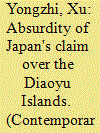

|
|
|
| 18 |
ID:
159181
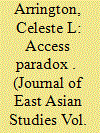

|
|
|
|
|
| Summary/Abstract |
To what extent is a diverse news media environment good for activists who seek attention for their cause? Scholars agree that activist groups depend on the media to reach policymakers and bystanders. Yet prior scholars have overlooked how factors that contribute to media environment diversity—including journalistic norms, market structures, outlets’ partisanship, and audiences’ news consumption habits—can have contradictory implications for activist groups. Disaggregating questions of gaining publicity from questions of the message and reach of coverage, this article shows that while pluralistic media environments are more accessible to activists, more homogeneous media environments help groups that manage to break into the mainstream news reach wider audiences with more coherent narratives. These findings challenge common assumptions about the news media in Japan and Korea. A paired comparison of hepatitis C-related activism in both countries demonstrates how the forces democratizing access to the media are paradoxically reducing the persuasive potential of publicity.
|
|
|
|
|
|
|
|
|
|
|
|
|
|
|
|
| 19 |
ID:
065116
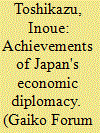

|
|
|
| 20 |
ID:
164246
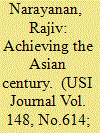

|
|
|
|
|
| Summary/Abstract |
From the dawn of history Asia had dominated the world trade and the global space due to its rich heritage, mature civilizations and its socio-cultural values. However, internal fissures and struggles, lack of strategic vision and a certain level of complacency led to the stagnation of innovation. They were thus left behind in the revolutions in economic and military affairs leading to their colonisation, economic depredation and penury. However, post-independence the robust economic rise of Asian economies since the late 1970s – the opening up of China, under Deng Xiaoping, to US to garner economic support in the late 1970s, the Japanese economic juggernaut, the rise of the Asian Tigers and the opening up of India’s economy in the 1980s and 90s led to the concept of ‘The Asian Century’ in the 21st Century. the gradual shift in the maritime trade centre of gravity to the Indo-Pacific Region symbolises this view despite scepticism in the West.
|
|
|
|
|
|
|
|
|
|
|
|
|
|
|
|
|
|
|
|
|